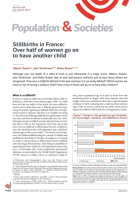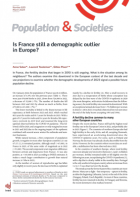@@src2@@
Tracking the lives of 20,000 children - Launch of the Elfe child cohort study
Population and Societies
n° 475, February 2011
Twenty thousand children born in France in 2011 will be followed from birth to adulthood to understand how the environment, their family life and their living conditions affect their health and development. The lead scientists of this study co-ordinated by INED and INSERM - the first of its kind ever conducted in France - explain the reasons behind its launch, the method used to recruit and follow the cohort of children, and the results they expect to achieve.






























